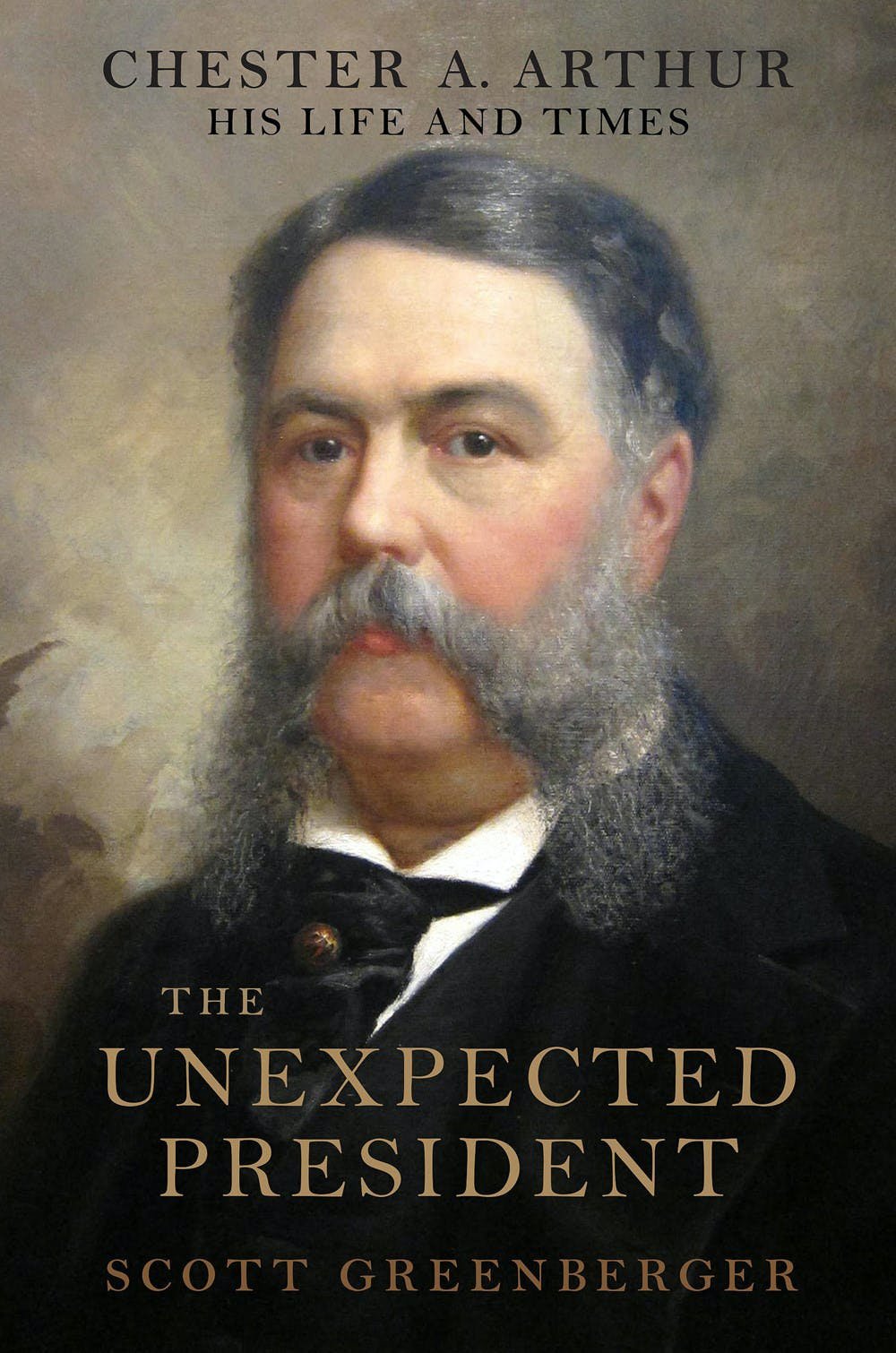Chester A. Arthur
The Unexpected President: The Life and Times of Chester A. Arthur by Scott S. Greenberger
Tier 5
Say what you will about President Arthur, his facial hair was something else. Imagine waking up every morning and sticking with that look. That takes perseverance and dedication.
Jokes aside, Arthur is a nearly forgotten figure in American history. I mentioned in a previous post that the president does not define some eras of our nation’s history. We live in an age with a heavy spotlight on that position, but it wasn’t always like that. Sometimes, notably in the post-Jackson/pre-Lincoln years, the nation’s fortunes were governed by Congress and the larger-than-life figures who resided there. At other times, as in Arthur’s day, the country turns its eyes to industrialists and inventors. And this often leads to forgotten presidents. And Arthur would rank high on the list of forgotten presidents.
Arthur was born in Vermont. He was the son of a preacher and attended college in New York. He briefly worked as a schoolteacher before pursuing a legal career and eventually moving to New York City, where he became involved in Republican Party politics. He served as Quartermaster General for the New York Militia during the Civil War and saw no fighting. His real break in politics came during the Grant administration when he was named Collector of the Port of New York.
This was a great job. It was corrupt and sketchy and powerful and incredibly lucrative. As Collector of the Port of New York, you were in charge of bestowing thousands of jobs and made more than the President of the United States. Arthur received this position because he was a loyal servant of the Republican Party. He was not a man to make waves or discuss his personal convictions. He did what he was told, toed the party line, and kept the machine running. Did Arthur do questionable things while collector? Almost certainly, but that has a lot to do with what was deemed questionable. It was accepted at the time that you would use a position like that to reward loyal party members. And that’s precisely what he did.
Unfortunately for Arthur, the new president Rutherford B. Hayes had promised to reform the spoils system and made the New York Republican machine a particular point of contention. Arthur tried to make the cuts that Hayes wanted, but it wasn’t enough, and a committee appointed to review the Custom House was very critical of Arthur in their report. Arthur hung on for a while, but in 1878, Hayes fired him.
Arthur was a surprise addition to Garfield’s presidential ticket. Garfield, for that matter, was a surprise. Most people expected Grant to return and once again run for president with James G. Blaine, a senator from Maine who was more amenable to civil service reform than Grant, as the primary challenger. But things don’t always go according to plan, and Garfield secured the nomination.
Then, on the convention floor, Garfield’s men decided to offer someone from New York the Vice-Presidential nomination. They couldn’t go to Roscoe Conklin, the head of the Republican machine in New York, as it was too lowly of an office for him (I bet he regretted that when Arthur became president), and his eyes were fixed on the top job. So, they turned to a man named Levi P. Morton, who would later serve as Benjamin Harrison’s Vice President. Morton consulted with Conklin, who advised him against joining what he saw as a doomed ticket. Again, Conklin advised not to accept the nomination, but Arthur ignored the advice of his long-time mentor and patron and accepted.
The election was close with General Winfield Scott Hancock, a popular hero of two wars, running against them, but in the end, Garfield and Arthur prevailed.
It seems clear that Arthur saw the Vice Presidency as the height of his political career. There’s no reason to believe he pined for the top job, and when Garfield was killed, he seemed mildly horrified over the prospect of serving as president.
As president, Arthur passed the Pendleton Civil Service Reform Act, which aimed to reduce political patronage and create a merit-based system for federal employment. This was quite a shock given that the spoils system had entirely formed Arthur’s career, but sometimes people surprise us.
There was a great deal in this book about Tariff Policy (the number of pages printed in presidential biographies about tariffs is staggering) and Naval expansion. Arthur suffered from health issues during his presidency, and despite considering a run for re-election, he understood it was not in the cards as essentially no Republican factions wanted him to run. After leaving office, he retired from public life.
So, what do we make of Chester A. Arthur? Fascinating and beguiling facial hair aside, he was forgettable. He was never elected president, and while the Pendleton Act was important, it’s hardly considered Arthur’s doing. He was a product of Conklin’s Republican machine, and it’s hard to see him as a more consequential figure than Conklin.
As for the biography, it isn’t memorable. Greenberger does his best, and you can see that he believes Arthur’s legacy should be more substantial than it is, but the argument is hardly convincing. Overall, I wouldn’t recommend it unless, like me, you’re a lunatic who intends to go through a biography of every president. Then have at it.
